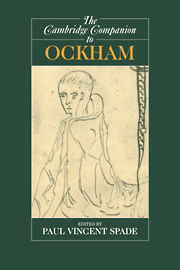Book contents
- Frontmatter
- Introduction
- 1 The Academic and Intellectual Worlds of Ockham
- 2 Some Aspects of Ockham's Logic
- 3 Semantics and Mental Language
- 4 Is There Synonymy in Ockham's Mental Language?
- 5 Ockhams' Nominalist Metaphysics
- 6 Ockham's Semantics and Ontology of the Categories
- 7 Ockham's Philosophy of Nature
- 8 The Mechanisms of Cognition
- 9 Ockham's Misunderstood Theory of Intuitive and Abstractive Cognition
- 10 Ockham's Ethical Theory
- 11 Ockham on Will, Nature, and Morality
- 12 Natural Law and Moral Omnipotence
- 13 The Political Writings
- 14 Ockham on Faith and Reason
- 15 Ockham's Repudiation of Pelagianism
- Bibliography
- Citations
- Index
2 - Some Aspects of Ockham's Logic
Published online by Cambridge University Press: 28 May 2006
- Frontmatter
- Introduction
- 1 The Academic and Intellectual Worlds of Ockham
- 2 Some Aspects of Ockham's Logic
- 3 Semantics and Mental Language
- 4 Is There Synonymy in Ockham's Mental Language?
- 5 Ockhams' Nominalist Metaphysics
- 6 Ockham's Semantics and Ontology of the Categories
- 7 Ockham's Philosophy of Nature
- 8 The Mechanisms of Cognition
- 9 Ockham's Misunderstood Theory of Intuitive and Abstractive Cognition
- 10 Ockham's Ethical Theory
- 11 Ockham on Will, Nature, and Morality
- 12 Natural Law and Moral Omnipotence
- 13 The Political Writings
- 14 Ockham on Faith and Reason
- 15 Ockham's Repudiation of Pelagianism
- Bibliography
- Citations
- Index
Summary
Medieval logic begins for most purposes with the work of Boethius, who attempted a Latin rendering of the standard late-antique Greek logic course. As the Boethian treatises began to be more widely studied in the ninth and tenth centuries, an indigenous Latin tradition in logic developed that reached its zenith during the twelfth century in the work of figures like Peter Abelard. It was within this indigenous tradition that the major developments in the medieval theory of inference took place and that the foundations of later pictures of meaning were laid. As the work of the Byzantine grammarian Priscian became known in Western Europe, the grammatical and semantic theory embodied in it fused with the indigenous tradition. The resulting picture was then transformed by a flood of new translations of texts of Aristotle, of Greek commentaries, and of Islamic commentaries and treatises. The thirteenth and fourteenth centuries saw the digestion of this material and its integration into the already existing tradition. Some consequences of this were new theories of the semantic properties of terms (including theories of the analysis of sentences), the development of propositional logic more or less as we know it today, the working out of the theory of the categorical syllogism (including its modal extensions), the flowering of modal logic generally, and the development of a general theory of inference. By the mid-fourteenth century these developments were more or less complete. William Ockham is one of the greatest of the figures who completed them. He is in some ways an idiosyncratic logician, but his importance can hardly be overestimated.
- Type
- Chapter
- Information
- The Cambridge Companion to Ockham , pp. 31 - 52Publisher: Cambridge University PressPrint publication year: 1999
- 23
- Cited by

